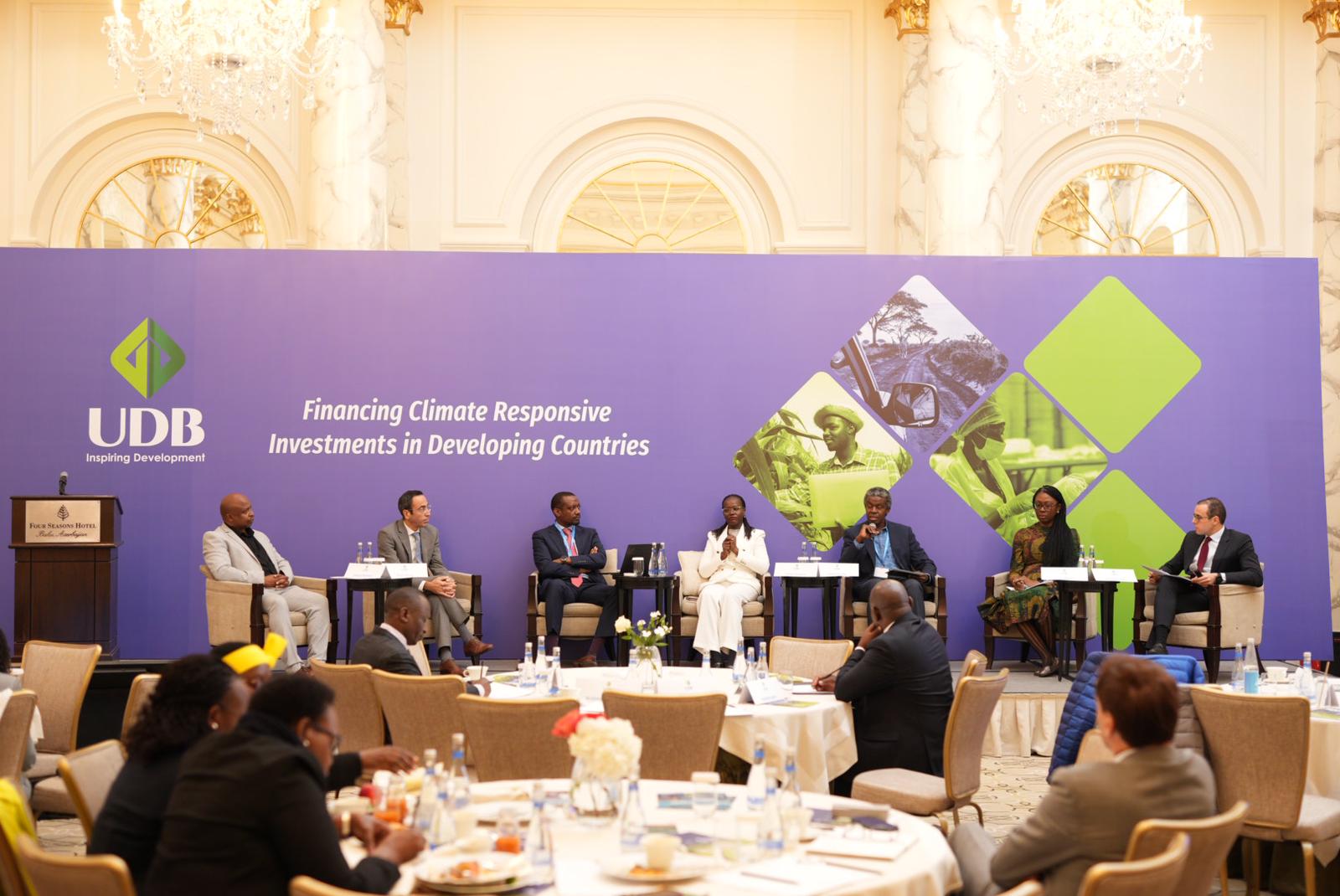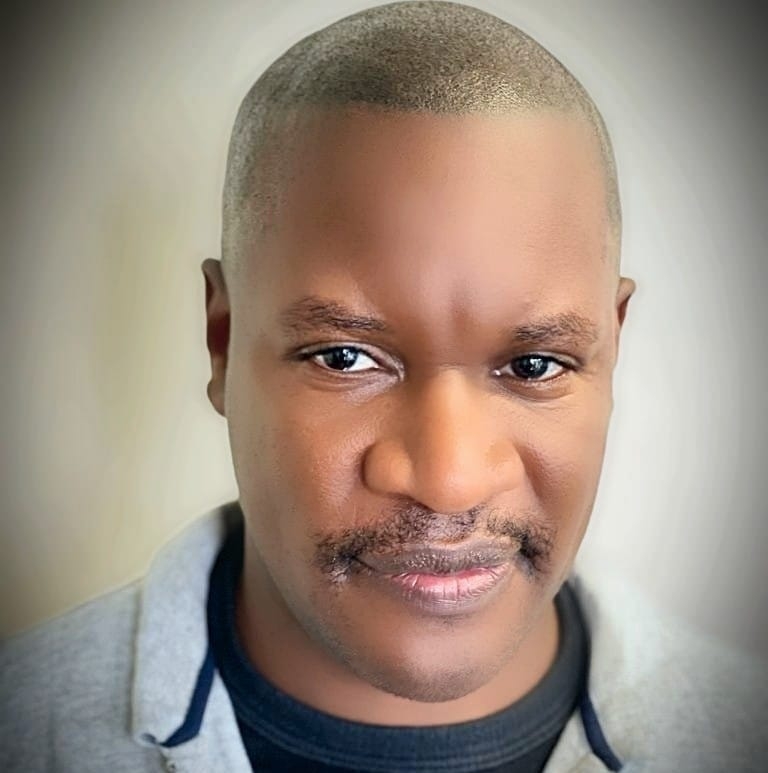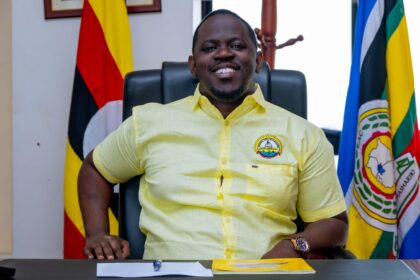The Uganda Development Bank (UDB) has hosted a pivotal Climate Finance Breakfast Roundtable on the sidelines of the 29th Conference of the Parties (COP 29), in Baku, Arzebaijan.
The high-level round table meeting brought together key stakeholders from across the sustainability and finance sectors to explore strategies for integrating climate action into development finance across Africa.
Led by UDB’s Managing Director, Patricia Ojangole, the meeting highlighted the urgent need for enhanced collaboration and financial investments in climate-friendly projects to address the growing climate crisis in the region.
During her address, Ojangole underscored the unique challenges that African nations, like Uganda, face as they are on the frontlines of climate change, while also showcasing how these countries are leading the way in innovative solutions. She emphasized the importance of climate-responsive investments, not just to protect the environment, but to create sustainable development opportunities for communities.
“The Bank established the Climate Finance Facility to coordinate green financing initiatives within UDB, provide technical support for structuring green interventions, and assess low-carbon, climate-resilient investments. Our goal is to deliberately finance interventions that reduce emissions and build resilience against climate impacts,” Ojangole explained. She also pointed to Uganda’s supportive policy framework as a key factor in attracting climate-focused investors to the country.
One of the central themes of the meeting was the need to build a pipeline of bankable projects that can attract private investment. Ojangole noted that UDB is not only working to mobilize climate finance but also ensuring that these projects are well-structured and financially viable. “By collaborating with the private sector, we are working to structure projects in a way that capital can be mobilized efficiently, making it easier to engage partners,” she stated.
The Bank’s approach to mainstreaming climate considerations into all facets of its operations has led to significant progress in integrating sustainability into sectors such as agrifood systems, sustainable industrialization, and services. This shift reflects a broader commitment within UDB to align its financing strategies with global climate goals, positioning the Bank as a key player in Africa’s green transition.
Ibrahima Cheikh Diong, the Executive Director of the Fund for Responding to Loss and Damage, delivered a keynote address emphasizing the urgency of addressing the climate crisis, which has already caused irreversible impacts in many African regions. He pointed out that the current climate reality, with its extreme weather events like floods and wildfires, is pushing vulnerable communities beyond their adaptive capacities.
“Climate change is no longer just a crisis, it’s an opportunity to accelerate development in Africa,” Diong said. He called on African governments to prioritize policies that incentivize climate action and attract private investment, noting that the right set of policy incentives could help build a strong pipeline of viable projects. “The issue is about creating the right incentives — governments need to ensure that climate projects are attractive to investors and that public-private partnerships are possible,” Diong added.
Joseph Ng’ang’a, Vice President for Africa at the Global Energy Alliance for People and Planet (GEAPP), highlighted the critical role UDB is playing in advancing climate initiatives across the continent.
He commended the Bank’s leadership under Ojangole, saying that UDB is well-positioned to address both climate and development challenges simultaneously. However, he stressed that unlocking the trillions needed for large-scale climate action requires a strategic approach that includes concessional funding to de-risk projects and attract private capital.
“Concessional funding is essential to prepare the ground for private capital,” Ng’ang’a said. “The right risk-return balance is key to unlocking the vast potential of Africa’s resources and opportunities for climate action.”
Lanre Shasore, Senior Advisor for Energy Transition Planning at Sustainable Energy for All (SEforALL), further highlighted the need for collaborative partnerships between governments, the private sector, financial institutions, and philanthropies to accelerate progress toward achieving Sustainable Development Goal 7, which aims to provide affordable, reliable, and sustainable energy for all by 2030. She also addressed the challenges posed by currency risks in African economies, noting that domestic financial institutions play a critical role in mitigating these risks and providing confidence to investors.
The event attracted a diverse group of participants, including government officials, financial institutions, and international organizations working in Africa and other developing regions. Discussions focused on fostering partnerships and mobilizing resources for green projects that can mitigate the adverse impacts of climate change on vulnerable communities.
The meeting concluded with a call to action for African governments, financial institutions, and development partners to work together in building a sustainable future through climate-resilient investments.
The discussions set the stage for deeper collaboration and the creation of new financial tools and mechanisms to support green development across Africa, with Uganda positioned as a key hub for climate finance on the continent.
Do you have a story in your community or an opinion to share with us: Email us at Submit an Article









